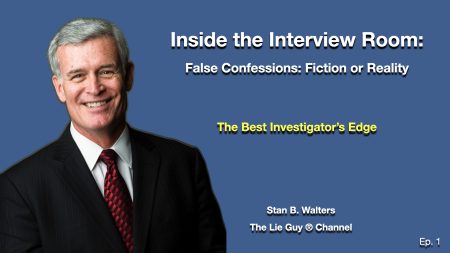Interview Tips and Techniques – Memory
Ethics of Lying to Subjects About Evidence.
Interrogation techniques taught to investigators run the gamut of styles and philosophies. Certain styles have a higher tendency of showing up in false confessions cases. One of the characteristics of those flawed techniques is the use of false evidence as a tool to get the subject to confess.
There are numerous “problem” interrogation techniques that teach and support the use of false evidence to put pressure on the subject. Suspect techniques tend to also recommend tactics that include suggesting unnamed witnesses, the presence of surveillance cameras when none exist, DNA, fingerprints, footprints, making up file folders purportedly filled with evidence, labeling DVD’s of video tapes with the subject’s name and more. This is typical of high pressure interrogation methods which in and of themselves have a high correlation with false confession.
A documented tactic used by some problem interrogation methods that has been shown to have a very strong correlation to false confessions is the use of the high pressure tactic of suggesting that the subject has a memory problem. There is empirical evidence that one of several common denominators found in false confessions is referred to as “memory distrust syndrome.” In many of these cases the subject need not have a “high suggestibility rating” as described in extensive research on false confessions. Using high pressure tactics, guilt assumptive techniques dominated by leading questions, interrupting the subject, short answer questioning techniques, combined with the interviewer suggesting the subject may not be able to trust their memory is a deadly combination.
Empirical studies of interrogation techniques that capitalize on false evidence do promote false confessions. Such tactics will also contaminate the statements of uncooperative victim’s and witnesses.
Our law enforcement training academies and corporate loss prevention training associations would do well if they would familiarize themselves with the techniques that promote such tactics. They are exposing themselves, their academies, their investigators and their companies to the risk of liability by training their personnel in methods and interrogation techniques that are now being made illegal in many countries.
I think it’s time we paid more attention to the interrogation methods we teach. Are we just training our personnel in a technique because of the name or more importantly, are we really aware of the the moral and legal ethical problems that exist due to the content of their training?
Of course, this is just my opinion on the topic.
Stan B. Walters, CSP
“The Lie Guy®”
TheLieGuy.com
TheLieGuyAcademy
